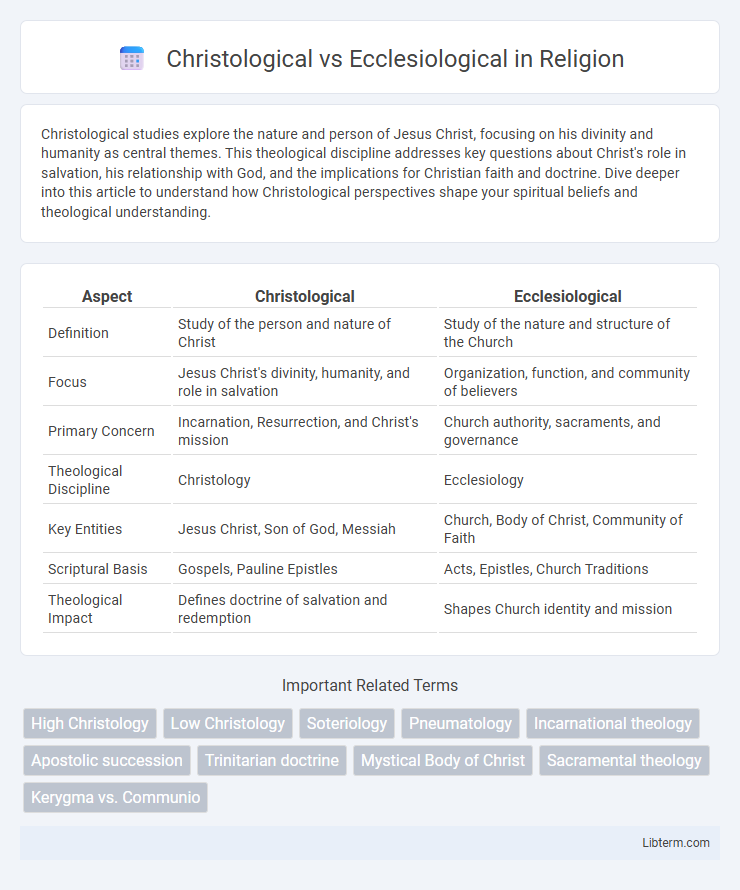Christological studies explore the nature and person of Jesus Christ, focusing on his divinity and humanity as central themes. This theological discipline addresses key questions about Christ's role in salvation, his relationship with God, and the implications for Christian faith and doctrine. Dive deeper into this article to understand how Christological perspectives shape your spiritual beliefs and theological understanding.
Table of Comparison
| Aspect | Christological | Ecclesiological |
|---|---|---|
| Definition | Study of the person and nature of Christ | Study of the nature and structure of the Church |
| Focus | Jesus Christ's divinity, humanity, and role in salvation | Organization, function, and community of believers |
| Primary Concern | Incarnation, Resurrection, and Christ's mission | Church authority, sacraments, and governance |
| Theological Discipline | Christology | Ecclesiology |
| Key Entities | Jesus Christ, Son of God, Messiah | Church, Body of Christ, Community of Faith |
| Scriptural Basis | Gospels, Pauline Epistles | Acts, Epistles, Church Traditions |
| Theological Impact | Defines doctrine of salvation and redemption | Shapes Church identity and mission |
Understanding Christological Perspectives
Christological perspectives center on the nature, person, and work of Jesus Christ, emphasizing doctrines such as the Incarnation, divinity, and atonement. These views shape theological discussions about Jesus' role in salvation and how believers relate to God through Christ. Understanding Christological positions helps clarify core Christian beliefs and informs interpretations of scripture and worship practices.
Defining Ecclesiological Concepts
Ecclesiological concepts focus on the nature, structure, and function of the Church, emphasizing its identity as the Body of Christ, a community of believers united under apostolic leadership. Key ecclesiological terms include "koinonia" (fellowship), "ekklesia" (assembly), and "hierarchy," which define the Church's communal life and governance. Defining ecclesiology highlights the Church's mission in salvation history, its sacramental role, and its relationship to Christ as both the Bride and the Mystical Body.
Historical Origins of the Christological Approach
The Christological approach originated in early Christian theology, emphasizing the nature and person of Jesus Christ as central to doctrinal development. This perspective emerged prominently in the first few centuries of the Church, notably through the debates of the Councils of Nicaea (325 AD) and Chalcedon (451 AD), which defined Christ's divine and human natures. The historical focus on Christ's identity shaped foundational Christian beliefs and influenced the formation of orthodox doctrine distinct from ecclesiological concerns about church structure and authority.
Development of Ecclesiology in Christian Tradition
The development of ecclesiology in the Christian tradition centers on understanding the nature and structure of the Church as the Body of Christ, rooted in Christological foundations that affirm Jesus as the divine Head. Early Church Fathers like Augustine and Aquinas expanded ecclesiology through interpretations of scripture and tradition, emphasizing the Church's role in salvation history and its visible unity. Modern theologians continue to explore ecclesiology by integrating Christological insights with contemporary challenges, fostering a dynamic relationship between the identity of Christ and the Church's mission.
Key Differences: Christology vs Ecclesiology
Christology centers on the person and nature of Jesus Christ, exploring his divinity, humanity, and role in salvation, while Ecclesiology focuses on the study of the church's structure, function, and mission. Key differences include Christology addressing theological doctrines about Christ's incarnation, atonement, and resurrection, whereas Ecclesiology analyzes church governance, sacraments, and community life. Understanding these distinctions is essential for grasping how Christian belief interprets both the identity of Christ and the organizational framework of the Christian community.
The Role of Jesus in Christological Thought
The role of Jesus in Christological thought centers on his identity as both fully divine and fully human, emphasizing the incarnation, atonement, and resurrection as key theological affirmations. Christology explores how Jesus' nature and work reconcile humanity with God, highlighting his unique mediatory role. This focus contrasts with ecclesiological discussions, which prioritize the nature and function of the Church as the body of Christ on earth.
The Significance of the Church in Ecclesiology
Ecclesiology emphasizes the Church as the living body of Christ, serving as the visible manifestation of God's kingdom and the primary instrument for salvation and community among believers. It highlights the Church's role in maintaining doctrinal purity, facilitating worship, administering sacraments, and nurturing spiritual growth. This focus contrasts with Christology, which centers on the person and work of Jesus Christ, underlining the Church's importance as a tangible extension of Christ's mission on earth.
Interactions and Overlaps Between Christology and Ecclesiology
Interactions between Christology and Ecclesiology reveal that the understanding of Christ's nature directly shapes the conceptualization of the Church as His body. Christological doctrines emphasizing Jesus as the head of the Church establish a foundation for ecclesiological principles regarding Church authority, unity, and mission. Overlaps occur as theological affirmations about Christ's divinity and humanity influence ecclesial practices, governance, and community life within Christian traditions.
Theological Debates: Christological and Ecclesiological Tensions
Christological debates center on the nature and person of Christ, addressing issues such as his divinity, humanity, and the hypostatic union, while ecclesiological tensions focus on the nature, authority, and structure of the Church as the body of Christ. These theological discussions often intersect, as differing Christological views impact ecclesiological doctrines, influencing concepts of apostolic authority, church unity, and sacramental efficacy. Historical councils like Chalcedon and Vatican II reflect how resolving Christological controversies shaped ecclesiological understandings and church governance.
Contemporary Relevance of the Christological-Ecclesiological Divide
The Christological-Ecclesiological divide remains crucial in contemporary theology, shaping how the nature of Christ influences the understanding of the Church's identity and mission. Christology, centered on the person and work of Jesus Christ, informs ecclesiology by defining the Church as the continuing presence of Christ in the world. Current debates around social justice, ecclesial authority, and ecumenism reflect this dynamic interplay, highlighting the ongoing need to balance theological clarity about Christ with practical expressions of communal faith.
Christological Infographic

 libterm.com
libterm.com